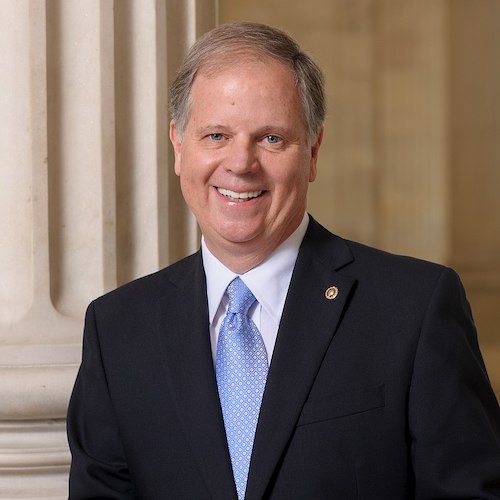Key actions and positions posted on the intersection of disability and education, jobs, immigration, climate crisis, criminal justice and more

Montgomery, AL, Sept. 23 – Incumbent Democratic Senator Doug Jones has responded to a detailed candidate questionnaire on disability issues. The questionnaire is from RespectAbility, a nonpartisan nonprofit disability organization that does not endorse candidates. The questionnaire is purely for educational purposes. RespectAbility has reached out to key Senate and gubernatorial campaigns on both sides of the aisle and will be posting all responses on The RespectAbility Report. The full text of RespectAbility’s questions and Sen. Jones’ responses follows:
1. Learning during the COVID-19 pandemic has led to more issues and concerns for all students and their families, but this is especially true for students with disabilities. Additionally, the gap in graduation and drop-out rates between students with and without disabilities continues to undermine their futures. For example, in the class of 2018, only 66 percent of Black students with disabilities, 71 percent of Hispanic students with disabilities, 77 percent of white students with disabilities, and 79 percent of Asian-American students with disabilities completed high school. Furthermore, just seven percent of students born with a disability graduate from college. What is your plan for ensuring that all students with disabilities receive a quality and appropriate education to acquire the critical and marketable skills necessary to compete in a job-driven economy?
Too often, state and local school districts, parents and students are left on their own to navigate Individualized Education Programs (IEPs). For many parents, this is a real challenge.
Unfortunately, in many school districts, students with disabilities are pigeonholed into a one-size-fits-all approach. As a result, those students often struggle to reach their maximum potential. I believe school districts need to take a broader approach towards evaluating all students, especially students with disabilities.
A teacher shortage also exists in terms of trained teachers and counselors for special needs students, especially in rural districts. I have introduced a bill, the Classrooms Reflecting Communities Act, that would help alleviate the teacher shortage crisis in Alabama and in communities across the United States. Importantly, my bill would authorize grant programs that would prepare prospective teachers to support students with disabilities and English language learners.
2. In the economic expansion prior to the COVID-19 pandemic, the national employment rate for working-age people with disabilities in America was 37.6 percent compared to 77.8 percent of people without disabilities. Further, there continues to be significant disparities in employment outcomes within the disability community, which varies from state to state. There are significant racial disparities in disability employment outcomes. 38.9 percent of working-age white people with disabilities have jobs compared to only 29.7 percent of working-age Black people with disabilities had jobs, 39.4 percent of working-age Hispanics with disabilities and 43.2 percent of working-age Asian-Americans with disabilities. The pandemic has ravaged the disability community and more than 1 million workers with disabilities have lost their jobs. If elected, what will you do to ensure that the government is removing barriers and promoting high quality, inclusive services built on evidence-based policies, practices and procedures leading to competitive, meaningful careers, which includes promoting entrepreneurial opportunities?
The employment gap is a glaring example of problems faced by people with disabilities. Here in Alabama, 29 percent of people with disabilities who want to work have jobs, while 31 percent live at or below the poverty level. Alabama ranks 46th in terms of the employment gap between those with disabilities and those without. This is unacceptable, and we must do more to close this gap.
Along with the unemployment gap, there is also the issue of underemployment – where people with disabilities work jobs beneath their skill level. As a nation, we shortchange ourselves through this practice. Hiring practices in the public and private sectors should be reflective of our country, and too often people with disabilities are overlooked.
We must do a better job of providing access to job training and educational opportunities to qualified individuals with disabilities in order to help them reach their maximum potential.
I support protecting the Americans With Disabilities Act and the Rehabilitation Act. At the end of the day, it’s about more than elevators, ramps and curb cuts. Far too often, fair and equitable treatment for people with disabilities is overlooked, and we must do more to ensure that they have equal opportunities to succeed.
3. The disability community fundamentally believes in the need to ensure “Nothing about us, without us” – real inclusion and places at decision making tables – because we know solutions that work and want to be a part of making our communities stronger. What specific measures have you taken to make your campaign accessible for, and inclusive of, people with disabilities, as every issue impacts our lives?
Our campaign includes individuals with disabilities, and true diversity is at the heart of our “One Alabama” effort. In fact, one of our staffers – an individual with cerebral palsy – attended the virtual RespectAbility summit marking the 30th anniversary of the ADA and meetings of the Alabama Disability Action Coalition in order to learn more about the issues specific to the disability community. We’ve also been working to address the economic, social and healthcare challenges faced by the disability community in the wake of the COVID-19 crisis.
4. RespectAbility published Disability in Philanthropy & Nonprofits, based on our study on the levels of disability inclusion in the social sector across the country. This largescale study found significant data showing that nationwide, organizations overall want to be inclusive, but are unintentionally excluding the one-in-five people with disabilities. What will you do to promote policies and practices designed to support full community engagement, access and inclusion of people with disabilities?
I believe social and philanthropic organizations should be reflective of the country as a whole – particularly with regards to organizations with a focus on disabilities, and I will continue to lead efforts like my bill, the Classrooms Reflecting Communities Act, that will provide better access, support and inclusion for people with disabilities.
5. Elected officials have multiple opportunities to demonstrate a strong commitment to diversity and inclusion, full community participation and celebrating the contributions and accomplishments of people with disabilities through press releases, speeches, celebratory events including National Disability Employment Awareness Month. There are significant stigmas that create attitudinal barriers that limit options and perpetuates low expectations for people with disabilities. What measures will you take to combat these stigmas and promote opportunities for people with disabilities?
Too often, accomplished individuals with disabilities are seen solely as “inspiration,” rather than citizens who are valued for their important contributions to our country.
Though it may be uncomfortable for the non-disabled community, we need to better educate the nation on how people with disabilities have been mistreated and marginalized by our society.
We need to better enforce policies to end sometimes-unintentional practices that result in discrimination against people with disabilities. For example, inaccessible neighborhoods often result in de-facto redlining of housing for the disabled. The more people with disabilities are fully included in our neighborhoods, economy and schools, the more likely we are to have meaningful discussions that lead to greater understanding.
Better access to quality affordable housing, transportation, education, healthcare and tougher enforcement of anti-discrimination employment laws are also critical.
6. In our nation’s public schools, there are 6.3 million students with disabilities. The changing demographics of America are reflected in these students, with 11.4 percent of students with disabilities nationwide, almost 720,000, also identified as English-language learners. Their accommodation needs are compounded by the fact that many come from households that do not speak English at home, adding an extra challenge for parental interaction. It can also be harder to diagnose disabilities in children when they are English language learners. Additionally, immigration issues and fears over the public charge rule impact students with disabilities, their families and the wider workforce. What policies would you advance to enable students and their families who are English language learners with disabilities to succeed in school and employment?
We need to provide greater resources for individuals with disabilities and that includes those for whom English is not the primary language. Incentives to grow the number of special education teachers and counselors who speak a second language need to be explored. This will help families navigate IEPs and to communicate and overcome their child’s educational challenges.
My bill, the Classrooms Reflecting Communities Act, which is designed to address the teacher shortage across our country, also authorizes grant programs that would prepare prospective teachers to support students with disabilities and English language learners.
Education is key for all children to succeed in the United States, and I will continue to work to ensure that children with disabilities, including the 720,00 immigrant children with disabilities for whom English is a second language, have access to quality education.
7. Housing, criminal justice, climate issues, transportation and every other area have significant impacts on people with disabilities. What additional policies and priorities, other than those already discussed above, do you plan to focus on to improve the lives of people with disabilities?
Too often, our policies in areas like criminal justice, education, housing, transportation and health care ignore the concerns of the disability community.
During the COVID-19 pandemic, many caregivers for people with disabilities have had to face the difficult choice of staying home from work and caring for their loved ones, or going to work and sending their loved ones to nursing homes or other facilities which place them at a higher risk of coming in contact with the COVID-19 virus. We need to make sure that these families are getting the resources and assistance they need during this pandemic.
Many qualified individuals with disabilities have yet to receive stimulus payments and many people with disabilities have lost their jobs in the wake of the pandemic. We must make sure that the needs of people with disabilities do not fall through the cracks and that they receive the assistance that they deserve. I am also hopeful that we can secure dedicated funding for Medicaid home and community-based services, paid leave for caregivers, and the necessary PPE for direct support professionals.
The bottom line is that every policy issue affects people with disabilities and should be considered – from access to quality food, housing, health care and jobs. The next decade must be a period that transforms access and inclusion for people with disabilities in every aspect of our society.
Sen. Jones is facing off against Republican Tommy Tuberville in this year’s closely watched election for the U.S. Senate. RespectAbility has contacted the Tuberville campaign about completing our nonpartisan questionnaire multiple times via email and we currently are waiting to receive their response.
RespectAbility is a nonprofit, nonpartisan organization that fights stigmas and advances opportunities so people with disabilities can fully participate in all aspects of their communities. RespectAbility does not rate or endorse candidates. View more coverage of 2020 candidates.

[…] Read Response in Full […]